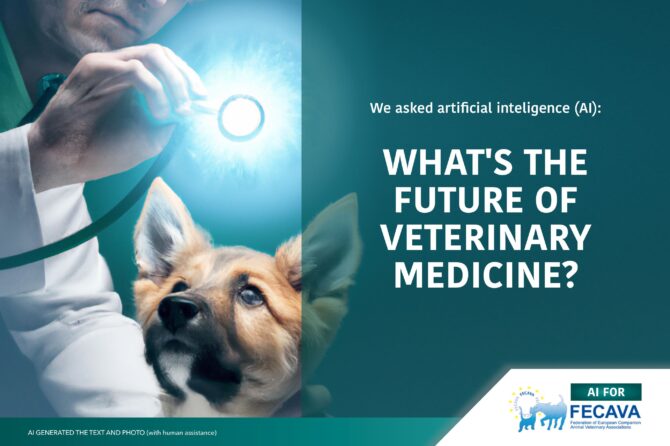
The Future of Veterinary Medicine as seen by AI
A lot is discussed about integrating artificial intelligence (AI) into veterinary medicine. That’s why we’ve decided to put it to work.
Every week we’ll have a post generated by AI (with human assistance).
This week we asked ChatGPT: “What’s the future of veterinary medicine?”
“The future of veterinary medicine holds tremendous potential for advancements in technology, personalized care, regenerative medicine, and the integration of human, animal, and environmental health. These developments aim to enhance the well-being of animals, improve treatment outcomes, and strengthen the bond between humans and their pets.”
Here are some key areas that are expected to shape the field:
1 Technology Integration: Veterinary medicine will continue to benefit from advancements in technology. Tools like telemedicine, wearable devices, and remote monitoring systems will become more prevalent, allowing veterinarians to provide better care and access to services for pets, even from a distance.
2 Personalized Medicine: Just as in human healthcare, personalized medicine will gain traction in veterinary medicine. Genetic testing, molecular diagnostics, and tailored treatment plans will enable veterinarians to provide individualized care based on a pet’s unique genetic makeup and health needs.
3 Regenerative Medicine: Stem cell therapy, tissue engineering, and regenerative techniques will play a more significant role in veterinary medicine. These innovative approaches hold promise for healing and repairing tissues, improving joint health, and treating chronic conditions in animals.
4 Preventive Care and Wellness: The focus on preventive care will continue to grow, with an emphasis on early disease detection and proactive measures to promote overall pet wellness. Vaccination protocols, nutritional counseling, behavior management, and regular check-ups will be key components in maintaining pets’ health and preventing diseases.
5 Advances in Surgery: Veterinary surgical procedures will see advancements through the integration of robotics, minimally invasive techniques, and advanced imaging technologies. These developments will result in less invasive procedures, reduced pain and recovery times, and improved surgical outcomes.
6 One Health Approach: The concept of One Health, recognizing the interconnectedness of human, animal, and environmental health, will gain further recognition. Collaboration between veterinary professionals, human healthcare providers, and environmental experts will become more prevalent to address zoonotic diseases and promote holistic health.
7 Expanded Specialty Care: Veterinary specialties will continue to expand, mirroring the growth seen in human medicine. Specialized fields such as oncology, neurology, cardiology, and rehabilitation will offer advanced diagnostic and treatment options for specific conditions, ensuring comprehensive care for pets.
8 Ethical and Social Considerations: There will likely be an increased focus on animal welfare, bioethics, and the ethical considerations surrounding veterinary medicine. Practices such as pain management, end-of-life care, and the responsible use of veterinary pharmaceuticals will be important topics for discussion and improvement.”
Leave a reply

Leave a reply